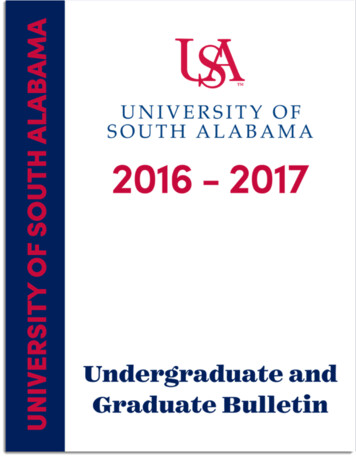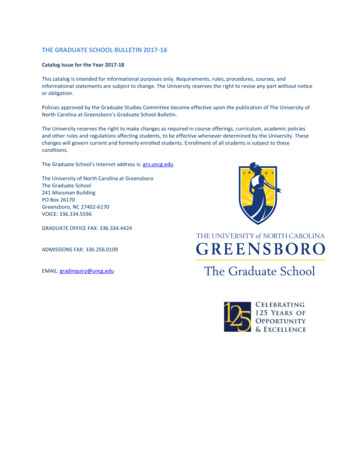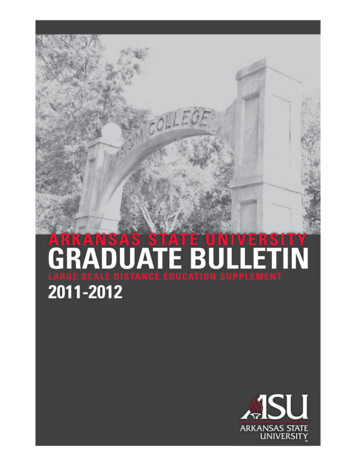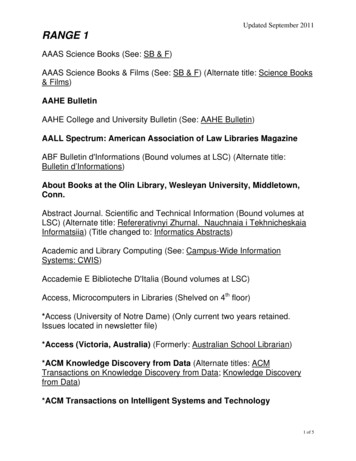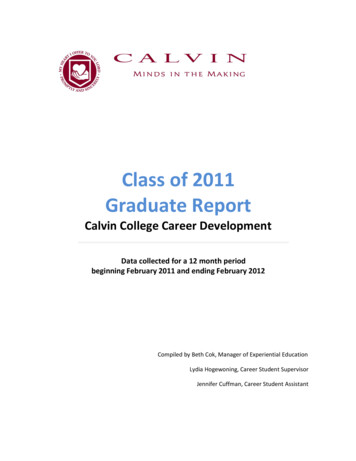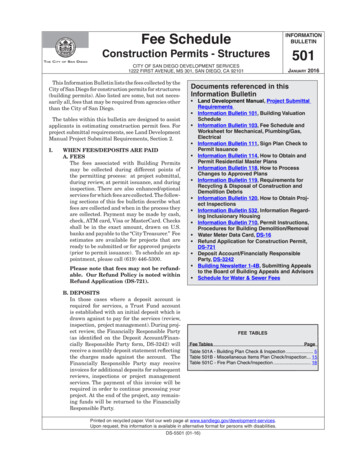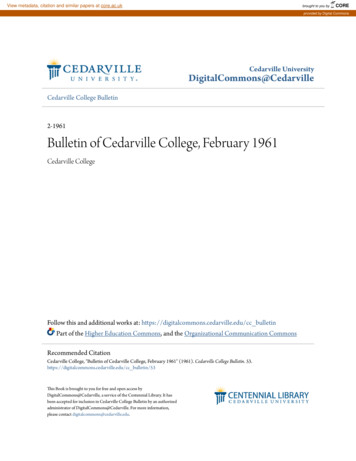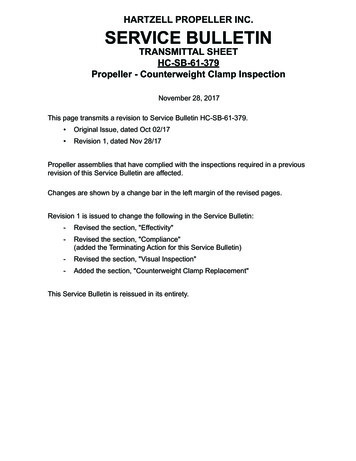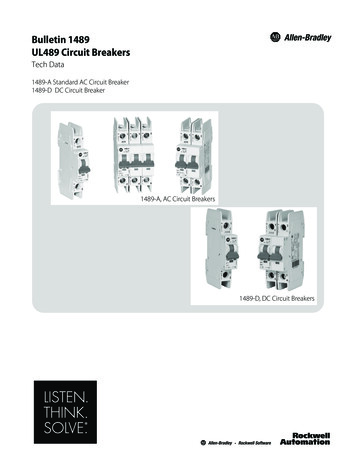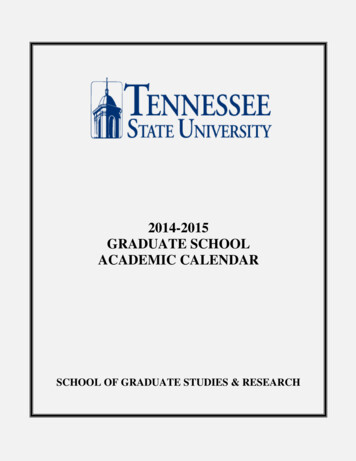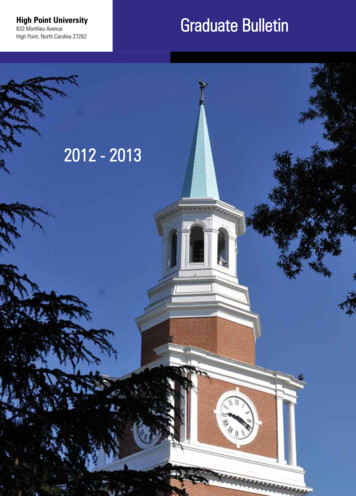
Transcription
High Point University833 Montlieu AvenueHigh Point, North Carolina 272622012 - 2013Graduate Bulletin
Dear HPU Graduate Student:Congratulations on being enrolled in graduate school andpursuing an advanced degree in your discipline. Educationmust be experienced in a continuum if it is to penetrate ourmind and influence our being. At High Point University, wevalue the power of discovery and promote the application ofholistic education in life.May your journey be filled with an appetite for learning andan appreciation for intellectual stimulation. Our stellar facultyare committed to your success and are qualified to guideyour campus experience. All of us at HPU focus on enablingour students to nourish their brain and nurture their heart . . .and we want YOU to be extraordinarily successful.Welcome to your university. Always reach up to the stars.Sincerely,Nido R. QubeinPresidentWelcome to High Point University’s Norcross GraduateSchool!Start planning your professional future today! Choosing theright graduate program can be an overwhelming decisionwith so many programs and options available. It takes timeto discover and learn what your personal goals are and if theymatch the school of your choice. Let me make the decisioneasier for you. The Norcross Graduate School can provideyou with an extraordinary graduate degree with fantasticfaculty who care about your success. Our contemporaryprogram and curriculum as well as state of the art facilitiescan help make your future brighter. See the difference HighPoint University can make for you.The Norcross Graduate School invites you to experience aprogram committed to you. All our advisors are available toanswer your questions. Please contact us anytime and takeadvantage of our open door. We are here to help you reachthe next step in your educational journey.Tracy CollumAssociate Dean of Graduate Enrollment Management,Norcross Graduate School
Graduate School BulletinTable of 57606263656667697071Connect with Norcross Graduate SchoolMaster of Business AdministrationM.B.A. Course DescriptionsDoctor of Education in Educational LeadershipDoctor of Education in Educational Leadership Course DescriptionsMaster of Education in Educational LeadershipAdd-On License in Educational AdministrationMaster of Education in Elementary EducationMaster of Education in Secondary MathematicsMaster of Education in Special Education with aConcentration in Intellectual DisabilitiesMaster of Arts in Teaching Elementary Education K-6Master of Arts in Teaching Secondary Mathematics 9-12Five-Year Program in Elementary EducationEducation Course DescriptionsMaster of Arts in Nonprofit ManagementNonprofit Course DescriptionsMaster of Arts in HistoryHistory Course DescriptionsMaster of Arts in Strategic CommunicationFive-Year Program in Strategic CommunicationStrategic Communication Course DescriptionsStaff & FacultyAdmissionEducational Fees & Financial AidGeneral PoliciesRegistrationGraduation PoliciesStudent ServicesA Brief HistoryHigh Point UniversityUniversity Honor & Conduct CodesAcademic Calendar
Connect with Norcross Graduate School6
7Norcross Graduate 336.841.9198Ashley DarrAdministrative Assistantadarr@highpoint.edu336.841.9020Lauren RathboneCoordinator of ara ShollenbergerGraduate School 3Charlie SwingCoordinator of Tracy CollumAssociate Dean of GraduateEnrollment raduateSchoolAt High Point University, every student receives anextraordinary education in an inspiring environment with caring people.SM
Master of Business Administration8Dr. Ross RobertsAssistant Professor of AccountingGraduate Program Director, M.B.A.336.841.4562rroberts@highpoint.edu
9The High Point University MBA program offers a practical, skills-based curriculum managers can apply in professional workenvironments. Students enjoy small classes and personal interaction with experienced professors who focus on a qualitygraduate learning experience. In the classroom, current business knowledge is delivered through the use of case studies,simulations, and a variety of projects. The program consists of 11 graduate courses (33 semester hours), which may becompleted within 21 months.Computer Requirement: A laptop computer is necessary to fulfill a number of course assignments and is, therefore required ofall students enrolled in the M.B.A. program.Degree: Master of Business AdministrationAdmission Term: Fall (August) onlyDeadlines for Application Materials: Applications receive primary consideration when completed by the priority deadline ofMarch 15, 2012. Applicants who do not meet the priority deadline, but still wish to be considered for admission may submitapplications by the final deadline of June 15, 2012.Application Requirements: Applicants must have a four-year bachelor’s degree from a regionally accredited college and anacceptable GPA (3.0 or higher on a 4-point scale). An admission decision takes into consideration the applicant’s GMAT or GREscore, GPA, completed course work, professional work experience, personal and professional goals for the degree, as well as theinformation provided by references.Required Materials Include: online application with a nonrefundable 50 application fee; an official transcript from all colleges attended (including High Point University); resume; essay about interest in the program and goals for the degree; three professional reference reports on form provided; and Graduate Management Admissions Test taken within the previous five years (the High Point University GMAT Code isZZG5V04).*Note* GRE scores obtained within the last five years may be substituted for the GMAT. Also the GMAT requirementmay be waived if an applicant has an earned master’s degree or higher from a regionally accredited college or university.Transfer of Credit: The M.B.A. program does not accept transfer of credit. All credit toward the degree must be earned in HighPoint University courses.Prerequisite Work: Three undergraduate hours each of accounting and economics are required. If needed, these courses areoffered at the graduate level. When taken after graduate admission, the courses constitute additional semester hours that mustbe completed beyond those required for the degree.Comprehensive Exams: NoneClass Time: 6:00 pm – 9:00 pmProgram of Study (33 semester hours)ACC 5130 Managerial AccountingBUA 5030 Communications for ManagersBUA 5310 The Legal and Regulatory Environment of BusinessECO 5090 Managerial Economics in a Global EconomyFIN5330 Financial Markets and Corporate StrategyMGT 5020 Leadership and Organizational BehaviorMGT 5290 Global Supply Chain and OperationsManagementMGT 5750MIS5400MKT 5110PHL5010Strategic ManagementInformation Systems in Practice: ManagerialChallenges and OpportunitiesMarketing in a Global EconomyManagerial Ethics
Master of Business Administration cont.10Prerequisite CoursesMBA 5000 Foundations of Accounting (3)An accelerated and in-depth introduction to the conceptualfoundations and practices of financial and managerialaccounting. This course is designed to show students therelationship of the cost function to other accounting andorganizational functions, and to increase the understandingof costs and cost behavior. Topics include cost informationfor planning and control, determining the cost of a productor service, analyzing the balance sheet, income statement,statement of cash flows, and the statement of equity to makebetter managerial decisions. MBA 5000 must be completedbefore enrolling in ACC 5130.MBA 5010 Foundations of Economics (3)A study of the combined elements of Macro and MicroEconomic Analysis for graduate students with no backgroundin Principles of Economics. This is an accelerated coursedesigned to provide students with an understanding ofeconomic concepts necessary to continue graduate levelcourses requiring both Macro and Micro Economics. MBA5010 must be completed before enrolling in ECO 5090.Core CoursesACC 5130 Managerial Accounting (3)A course emphasizing basic accounting techniques andtheir use in preparing and analyzing financial statementsand in making managerial decisions. This course will showthe relationship of the cost function to other accounting andorganizational functions. Students will acquire anunderstanding of costs and cost behavior as well as acquiringthe skills to use cost information for planning and controldecisions. Prerequisite: MBA 5000 or undergraduate orgraduate equivalent.BUA 5030 Communications for Managers (3)This course is designed to examine and improve thecommunications skills of managers. The course will focus onissues in communication essential to effective leadership inbusiness settings and will include both verbal and nonverbalforms of communication. Special attention is given tocrisis communications, reputation management, practicalcommunication principles and theories applicable in real worldsettings, everyday communications in the modern businessenvironment – including written and oral interactions, thedevelopment of critical thinking skills and the developmentof understanding of language for building and maintainingcorporate integrity.BUA 5310 The Legal and Regulatory Environmentof Business (3)The primary purpose of this course is to help managersunderstand the maze of government regulations. After anintroduction to the basics of administrative law, students willcover areas of regulation including labor and employment law,environmental law, securities regulation, and antitrust law.Students will also study intellectual property law and legalissues relating to consumer protection, commercial speech,and the regulation of advertising.ECO 5090 Managerial Economics in a Global Economy (3)A study of how economics helps managers make betterdecisions. An emphasis is placed on forecasting anorganization’s sales through tools such as regression analysis.Other topics include how organizations can optimize theirproduction decisions, manage their costs, and respondprofitably to regulation and deregulation. Throughout thecourse, the effects of globalization and global economicpolicies are discussed. Prerequisites: MBA 5010 orundergraduate or graduate equivalent.FIN 5330 Financial Markets and Corporate Strategy (3)This course integrates capital structure and corporatefinancial decisions with corporate strategy. It looks atfinancial decision making with the objective of understandingits relation to corporate strategy. An integral area is theunderstanding of financial markets and valuation and learninghow to carry this understanding to real domestic and globaldecisions. This course addresses other important issuesfacing financial managers such as allocating capital for realinvestments, financing the firm, knowing whether and how tohedge risk, and allocating funds for financial investments.“At High Point University, I have avoice. I like the personal attentionI receive from the faculty andstaff, and I enjoy the hands-onlearning experiences.”- Jeremy StricklandMBA student
11MGT 5020 Leadership and Organizational Behavior (3)A course designed to improve leadership skills of managers.Students will explore how to develop a high performingorganization through the study of leadership theory andpractices, organization culture, motivation, decision-making,and group behavior.MGT 5290 Global Supply Chain and OperationsManagement (3)Operations and supply chain management are the meansthrough which a firm’s strategic plans are effectivelyrealized. Typically, the vast bulk of a company’s people andassets are engaged in operations of one sort or another.Managing operations means dealing with products andservices. This course will sharpen participants’ insights tothe impact of corporate decisions on operations and supplychain management through data analysis, case studies, anddevelopment of a publishable paper. Prerequisites: significantcontent coverage in statistics. Co-requisite: ECO 5090 or MBA5070 or undergraduate or graduate equivalent.MGT 5750 Strategic Management (3)This is the capstone course in the MBA program. Strategydevelopment and implementation will be examined. Thiscourse will sharpen participants’ insights to the complexity ofstrategy formulation and execution through executive decisionmaking in a global environment, development of businessplans, and case studies. Recommended Pre/Co-requisites:ECO 5090, FIN 5330, MGT 5290, and MKT 5110.MIS 5400 Information Systems in Practice:Managerial Challenges and Opportunities (3)The course addresses contemporary information systemsimplementation, operations, and management issues.Students will consider how information technology can beused to achieve business goals and leverage information forcompetitive advantage.MKT 5110 Marketing in a Global Economy (3)This course emphasizes development of sound marketingstrategies within a global context. Product, promotion,price, and distribution decisions will be examined within theconstraints of cultural, political, and economic settings thatconfront multinational enterprises.PHL 5010 Managerial Ethics (3)Recognition of and response to ethical issues, which occur inmanagerial settings. Case studies will be used to stimulatereflection on individual and societal moral values and to helpstudents identify recurring problems of values arising in theirmanagerial settings. The seminar focuses also on how ethicalissues arise in the practice of management and how the useof ethical theory can be employed to clarify these issues.
Doctor of Education in Educational Leadership12Dr. Vernon FarringtonCoordinator of Doctoral Program inEducational LeadershipAssociate Professor336.841.4688vfarring@highpoint.edu
13The doctoral degree program in Educational Leadership is a practitioner-based, professional experience that focuses on thepractices transformational leaders need to create educational systems that are grounded in research, are culturally responsive,strategic, and which ultimately improve student learning. The 60-hour program of study reflects the visionary thinking neededfor leadership in today’s 21st century educational organizations. It emphasizes effective leadership including strategic planning,using data to make instructional improvements, building a culture of trust and understanding how theory guides the educationalleader to solve problems of practice. Graduate courses will be delivered using an Executive Cohort model which is designed toaccommodate the working professional and emphasizes problem-based learning, action research, and field-based projects usingauthentic school district data and artifacts.Program Goals: The following program goals are directly aligned to the North Carolina Guiding Mission for Public P-12 Schoolsand to High Point University’s mission to “.deliver educational experiences that enlighten, challenge, and prepare students tolead lives of significance in complex global communities.”1. To train the prospective school executive in practices which are aligned to the guiding mission of N.C. public schools increating Future-Ready and Globally Competitive students who are prepared for life in the 21st century.2. To assist the prospective school executive to understand the role of leadership as a collection of practices that mustbe embedded in all job roles and at all levels of the school district.3. To provide the prospective school executive with the skills needed to engage in transformational leadership so thatlarge-scale sustainable improvements are consistently part of the basic modes of thinking and doing.4. To equip the prospective school executive with the tools needed to create systems and practices of distributedleadership which allow district-wide tasks to be accomplished proficiently.5. To assist the prospective school executive to skillfully align the various leadership systems of local boards of education,central office, schools, classrooms, etc. so that they are mutually supportive of each other.6. To assist the prospective school executive to understand the connection between the context of school districtleadership with his/her own leadership character and practices.Degree: Doctor of Education (Ed.D.)Admission Terms: Fall (August) OnlyDeadlines for Application Materials: All application materials must be received or postmarked by the final deadline ofMay 31, 2012.Application Requirements: A minimum GPA of 3.0 for the earned Master’s degree is required; The earned Master’s degreemust be in professional education (or related field) from a regionally accredited university; the combined Verbal Reasoning andQuantitative Reasoning GRE General Test Scores (for tests taken before August 1, 2011) on the prior 200-800 scales shouldbe at least 1100. The combined Verbal Reasoning and Quantitative Reasoning GRE General Test Scores (for tests taken afterAugust 1, 2011) on the new 130-170 score scales should be at least 302. Candidates who submit the MAT are expected tohave a minimum score of 410; and a minimum of three years’ experience as a principal or professional educator in a leadershipor supervisory role.Application Materials: High Point University has established rigorous admission requirements for the Ed.D. in EducationalLeadership. To be considered for admission, applicants must submit the following:1. A completed online application submitted through the Norcross Graduate School at High Point University;2. Official undergraduate and graduate transcripts from all college coursework, a minimum GPA of 3.0 for the earnedMaster’s degree is required; The earned Master’s degree must be in professional education (or related field) from aregionally accredited university.3. Official scores on the Graduate Record Examination (GRE) or the Miller Analogy Test (MAT) taken within the last five
Doctor of Education in Educational Leadership cont.14years. The combined Verbal Reasoning and Quantitative Reasoning GRE General Test Scores (for test taken beforeAugust 1, 2011) on the prior 200-800 scales should be at least 1100. The combined Verbal Reasoning and QuantitativeReasoning GRE General Test Scores (for tests taken after August 1, 2011) on the new 130-170 score scales should be atleast 302. Candidates who submit the MAT are expected to have a minimum score of 410;4. All professional School Administration/Teaching or other professional licenses (if applicable);5. A current curriculum vita outlining significant leadership activities and involvement in professional organizations,professional presentations, or district-level initiatives;6. Three professional letters of recommendation and accompanying Leadership Disposition Evaluations by individualswho are familiar with the candidate’s work and leadership potential (standardized forms are available with onlineapplication);7. Written responses to four essay prompts in Strategic Leadership, Data and Learning, Building Relationships, andTheory and Practice;8. A minimum of three years experience as a principal or professional educator in a leadership or supervisory role.Once Admitted: A signed Memorandum of Understanding by the district superintendent or designee endorsing the candidate’spursuit of doctoral study and subsequent internship within that district or educational setting will be required.Comprehensive Exams: NoneClass Time: One weekend per month, Friday evening and SaturdayProgram of Study (60 hours)EDU 7171 Leadership Theory: Human Dynamics, Ethics, and Organizational EffectivenessEDU 7172 Leading in an Age of Accountability: Roles, Responsibilities & FunctionsEDU 7173 Meeting the Challenge: Strategic Planning for 21st Century SchoolsEDU 7174 Exemplary Teaching and Learning Practices for Extraordinary SchoolsEDU 7175 Using Data to Inform Learning, Teaching, and LeadershipEDU 7176 The Nature of Organizational Cultures & Shared LeadershipEDU 7271 Political Systems: Effects on Governance and OperationsEDU 7272 Community and Public RelationsEDU 7273 Intercultural Communication Skills for Contemporary School LeadersCOM 6610 Applied Strategic Communication PracticesEDU 7274 Budgeting and Finance of Public School OperationsEDU 7275 Human Resources: Approaches to Enhance School EffectivenessEDU 7371 Education Reform in the United States: Innovative Practices to Change America’s SchoolsEDU 7372 Law and Policy: Governance of 21st Century SchoolsEDU 7373 Research Analysis in EducationEDU 7374 Applications of Research for Solving Problems of PracticeInternship ExperienceEDU 7300 Practices in Executive Leadership I: Organizing for Problem SolutionEDU 7300a Practices in Executive Leadership I: Organizing for Problem Solution ContinuationEDU 7400 Practices in Executive Leadership II: Collaborating for Problem SolutionEDU 7400a Practices in Executive Leadership II: Collaborating for Problem Solution ContinuationCapstone ExperienceEDU 8300 Capstone Project: Implementation of Problem SolutionEDU 8300a Capstone Project: Implementation of Problem Solution ContinuationEDU 8400 Capstone Project: Evaluation of Problem SolutionEDU 8400a Capstone Project: Evaluation of Problem Solution ContinuationTransfer of Credit: The Ed.D. program does not accept transfer of credit. All credit toward the degree must be earned in HighPoint University courses.
15Course DescriptionsCOM 6610 Applied Strategic CommunicationPractices (3)This course focuses on creating an effective communicationsplan that develops a powerful brand and defines theessential vision and message of the organization. Availablecommunications methodologies will be explored andevaluated along with a special emphasis on the use oftechnology in strategic communications and messaging.Candidates will have the opportunity to explore strategiccommunication from the role of the superintendent as chiefcommunicator. Spring, Year 2EDU 7171 Leadership Theory: Human Dynamics,Ethics, and Organizational Effectiveness (3)This course focuses on creating an understanding of howto develop and support the organizational change process.Candidates will study formal and informal leadership skillsthrough discussions of the dynamics of intrinsic and extrinsicmotivation. Strategies for influencing personnel and creatinga personal plan for growth and self-development that includescultivating a support network for growth as a school leaderwill also be covered. Fall, Year 1EDU 7172 Leading in an Age of Accountability:Roles, Responsibilities & Functions (3)This course explores the scope of the superintendency andother educational leaders. An examination of the roles andresponsibilities of the district leaders as defined by law,policy and public expectations will be emphasized. Topicsincluding school board/superintendent relations, building anadministrative team, and developing a shared vision thatis supported by educational staff and stakeholders will beaddressed. Fall, Year 1. Three day shadowing of the districtsuperintendent or educational designee required.EDU 7173 Meeting the Challenge: StrategicPlanning for 21st Century Schools (3)This course will begin with an examination of the GuidingMission for N.C. Public Schools adopted by the N.C. StateBoard of Education in 2006. Specifically, the impact of thismission, to Prepare Future-Ready and Globally CompetitiveCitizens Who are Prepared for Life in the 21st Century willprovide the foundation for discussions involving districtstrategic planning. An examination of the processes andmechanics of creating and implementing a strategic planwill be highlighted. Various planning models that facilitateempowerment of local school and community leaders inthe planning and implementation processes will be shared.Attention on developing a shared vision, team-buildingstrategies, aligning district and school-based plans as theyrelate to the broader N.C. Mission will be emphasized.Spring, Year 1EDU 7174 Exemplary Teaching and LearningPractices for Extraordinary Schools (3)This course focuses on the fundamentals of pedagogy andhow the superintendent and other district leaders can serveas instructional change agents in the teaching and learningprocess. Candidates will explore research-based bestpractices related to student learning and identify effectiveK-12 teaching practices. Current educational initiatives will bediscussed such as the Core Essentials Standards, STEM, Raceto the Top, and Virtual Schools. The impact of policyon class organization, grouping, class size and instructionalmethodologies will also be emphasized. Spring, Year 1EDU 7175 Using Data to Inform Learning, Teaching,and Leadership (3)This course focuses on improving instruction throughthe proper use of formative and summative evaluationsand monitoring processes to enhance effective programimplementation. Specific focus on the use of ProfessionalLearning Communities (PLC’s) as the guiding framework forcollaboration will be presented. Candidates will be introducedto the skills that district leaders must possess in order tosuccessfully promote shared decision-making to addressstudents’ needs and improve learning. Summer, Year 1EDU 7176 The Nature of Organizational Cultures andShared Leadership (3)This course is designed to assist candidates in theirunderstanding of how complex organizations work. Anexploration of formal and informal organizational dynamicsincluding how to develop a collaborative culture for creatingshared leadership and decision making to solve educationalchallenges will be emphasized. Summer, Year 1EDU 7271 Political Systems: Effects on Governanceand Operations (3)This course will focus on the variety of political forces that areexerted in a public school district’s decision-making processand gaining a broader understanding of the school district as apolitical system. Cases will be used to explore how the schooldistrict functions by using political systems analysis. Attentionwill be given to the uniqueness of the superintendent/boardrelationship and the superintendent’s role as chief executiveofficer in a complex political system. Fall, Year 2EDU 7272 Community and Public Relations (3)This course will focus on how to locate key communityconstituencies and leaders. Candidates will learn the stepsin developing a plan for communication that nurtures strongrelationships with community constituents and their leaders.Students will be exposed to successful cases of improvedpublic and community relations. They will learn how toassess community support along with both defining/refiningthe district’s mission and message. This will also includeeffectively gauging and dealing with opposition to districtinitiatives. Fall, Year 2
Doctor of Education in Educational Leadership cont.16EDU 7273 Intercultural Communication Skills forContemporary School Leaders (3)This course examines the range of communication issues thatare prevalent within an organization made up of individualsfrom different religious, social, ethnic, and educationalbackgrounds. A focus on language, social attributes, and anunderstanding of culture and customs when delivering public,written, and electronic messaging will be explored.Spring, Year 2EDU 7274 Budgeting and Finance of Public SchoolOperations (3)This course assists candidates to understand the process fordeveloping a district budget and the relationship of the budgetto strategic plan priorities. Focus will be placed upon legalrequirements, time constraints, the need for transparencyand staff and public participation in the process. Candidateswill examine federal, state and local funding and grantand proposal processes for funding operating and capitalimprovement budgets. Attention will be paid to establishingpublic trust through effective communication about districtfiscal matters and collaborative and ethical practices.Summer, Year 2EDU 7275 Human Resources: Approaches to EnhanceSchool Effectiveness (3)This course will focus on identifying human resource needs,staffing formulas for allocation of personnel, legal andpolicy requirements for hiring, discipline and termination ofpersonnel. Additional areas of emphasis will include the roleof the human resource division in promoting the mission of theorganization, school or district as it impacts the monitoring ofhuman resource functions. Summer, Year 2EDU 7371 Educational Reform in the United States:Innovative Practices to Change America’sSchools (3)Beginning with an in-depth discussion of articles such asA Nation at Risk, candidates will explore notable attemptsat major educational reform including outcomes-basededucation, No Child Left Behind (NCLB) and variousalternatives to public education. National and Internationalmodels of school reform will be presented. This course servesas a prerequisite for candidates beginning the capstoneexperience. Fall, Year 3EDU 7372 Law and Policy: Governance of 21stCentury Schools (3)This course focuses on assisting candidates to understandhow law and policy may permit or prohibit district action.A focus on gaining an understanding of the Constitutionalfoundations of schooling and the rights of citizens, theprocess of policy analysis, development and implementationand relationships, and responsibilities of school personnel andschool boards as defined by law and policy will be highlighted.Fall, Year 3EDU 7373 Research Analysis in Education (3)This course will allow candidates to understand the criteriafor selecting credible research organizations. A variety ofresearch reports and findings on educationally relevantissues and problems will be addressed as candidates learnto match research findings with local and practical districtissues. Applications of research analyses including identifyingpractical school problems; creating research summaries/briefing papers that form the beginning of rese
Welcome to High Point University's Norcross Graduate School! Start planning your professional future today! Choosing the right graduate program can be an overwhelming decision with so many programs and options available. It takes time to discover and learn what your personal goals are and if they match the school of your choice. Let me make .
